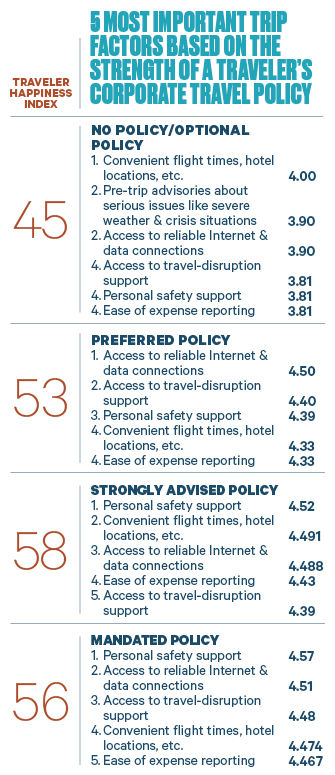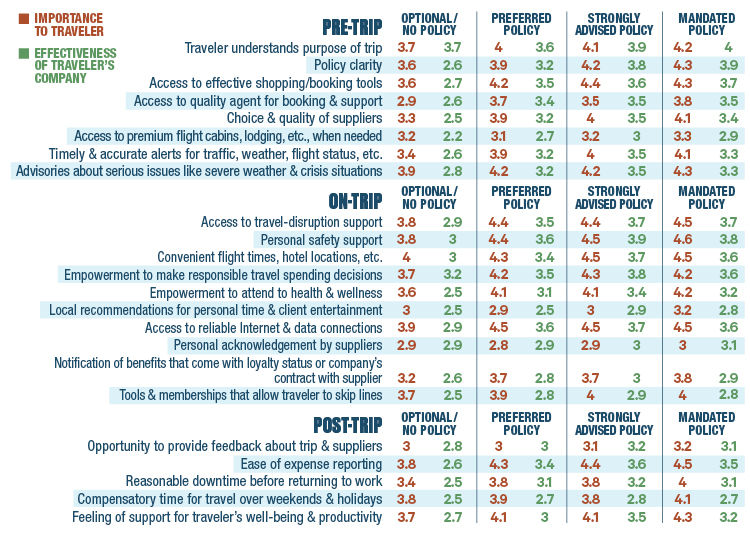
A little bossiness may be a good thing. Consider that no
group of business travelers is less happy than those who have no travel policy
or a policy in which every decision is optional. That's across both genders and
various age groups, levels of international travel, trip frequencies and travel
policies. All 18 groups studied in BTN's Traveler Happiness survey registered
scores between 50 and 60—except those with no policies or optional policies.
And after those who travel abroad the most, the next most disillusioned group
is those with preferred travel policies.
A strong travel policy, in contrast, presents travelers with
filtered but reasonable options and in exchange makes them feel supported and
safe. These travelers are among the Traveler Happiness Index's happiest.
Travelers with Lenient Policies Crave Guidance
Based on BTN's survey, the less managed the traveler, the
more he or she desires clarity on the travel policy. BTN spoke to two travelers
whose companies had eliminated most of the rules around travel. One directed travelers
simply to use good judgment, and now, "I find picking hotels and picking
flights kind of stressful," he said. The other's company emailed travelers
just to "be humble and confident" in their travel decisions. Instead,
she feels uncertain. "I kind of wish there was more guidance in terms of
what to spend," she said. "I feel like I'm always trying to spend as
little as possible because I just don't know what's OK. ... I would stay at a
little nicer hotel if I just knew what I could spend."
Highest-Impact Opportunities
Identifying the
elements of the trip experience that travelers find most important, as BTN has
done in the table above, is interesting. The biggest opportunities to make an
impact on your travel program, however, come when you weigh importance against
how well travelers think their companies deliver. Travelers with mandated
policies for instance, rate personal safety support at 4.6 on a five-point
scale for importance. Scroll to the Traveler Perceptions table at the bottom
and you'll see that they rate companies' efficacy in that category at 3.8,
leaving a gap of 0.8. That's something travel programs could work on. But look
just a little lower on mandated travelers' importance scale and you'll find that
pre-trip travel advisories about serious incidents is rated 4.3 while their
companies' efficacy is 3.3. That larger, one-point gap, is a bigger
opportunity.
The most important factors with the biggest gaps between
importance and delivery are your biggest opportunities. Dig around in the Traveler
Perceptions table at the end of each Travel
Program Opportunities story for more.
Those with no policy or optional policies might be even more
dissatisfied if they weren't so indifferent. They considered three-quarters of
the trip factors BTN studied, such as choice and quality of suppliers and ease
of expense reporting, to be less important than their more tightly managed
peers did (the Traveler Perceptions chart below). That
suggests managed travelers have been exposed to and understand the benefits
travel management can deliver.
Travelers with strong policies not only find most trip
factors more important, but they also think their companies are delivering.
Stronger requirements on travelers enable their companies to offer more in
return. An investment banker, for example, told BTN her company has negotiated
airport lounge access for all travelers, enables travelers to use company rates
for personal travel, and subsidized Global Entry and TSA Precheck
registrations. An HR exec who previously worked under a highly managed program
and now works for herself told BTN she misses the VIP treatment of corporate
travel discounts for personal travel. "I'm just back to being a regular
old mass-produced human," she said.
Mandating May Overcorrect
A travel program can go too far, though. Travelers operating
under mandated programs, even if they're relatively satisfied, are less so than
their strongly advised counterparts. One traveler who works for the federal
government, for example, said, "I'm forced—and the word I chose probably
gives you my idea of how I feel about it—I am forced to use" a proprietary
online booking tool.
She also expressed frustration with the lack of flight
choices available when flying between two non-hub cities. "We can't go out
in the commercial market and choose the best flight for us," she said. "We
have to choose … contract airfare or go through certain processes that are
cumbersome to justify" it. Another traveler's company just instituted a
voucher system with a major airline that is now mandated. When she could choose
carriers, she'd used business travel to build up status and points with another
airline. She has joined the mandated carrier's program, but it'll take a while
to accumulate enough "to make any difference," she said.
Additionally, the new carrier does not serve her personal-travel destinations
well.
BTN also spoke with an HR executive who feels the friction
of his company's strong-arm tactics. Should he not book through the company's
booking tool, not eat breakfast at his hotel even for months straight or not
log expenses in a timely fashion, his chain of command is notified and it
factors into his performance review.
The restrictions of a mandated program affect the company,
too, according to the federal employee. "If I was able to choose fares
based upon what works best for the organization and myself, as opposed to being
locked into a government contract, I would have greater flexibility and maybe
even cut back on the time spent traveling."
Opportunities to Improve Strongly Advised Programs
Policies that strongly advise travelers produce the happiest
travelers. These policies provide options, allow exceptions, support travelers
and provide benefits. Strongly advised travelers were the only ones in BTN's
survey that did not indicate substantial room for improvement for their travel
programs to support well-being and productivity. They did indicate room for
improvement in booking tools, as well as convenient flight times and hotel
locations. A producer with a strongly advised policy noted, for example, "You
try to do the most economical thing, but a lot of times, time is the most
important part because there are deadlines."
The problem arises when two things happen at once: booking
tools push preferred options that don't make sense and the process for gaining
an exception is cumbersome. "I always felt like it was shackling me by
attempting to find the best option," one traveler said of his booking
tool. Another traveler grew frustrated when she was heading to Princeton, N.J.,
but her booking tool presented a preferred hotel in Philadelphia's Center City,
an hour away. She ultimately booked a closer hotel but first had to explain the
problem and get approval.
Once a booking is out of policy, expensing can get
complicated, too. The same traveler who had trouble with her Princeton trip
also couldn't find any hotels in the booking tool near her destination in
France. "Even though all our bosses approved it, getting through the
[expense] system to be reimbursed later was a little bit of a pain." She
explained that the audit system, like the booking tool, did not employ critical
thinking. "It seemed like either the algorithms or the people assessing it
didn't necessarily know what was going on. I remember I got something kicked
back with a note, 'You can't charge gas unless you had a rental car,' and on
the same receipt was a rental car."
Safety & Security: It's for Their Own Good
According to BTN's survey, the stronger the travel policy,
the better it supports travelers' safety. An environmental lawyer noted that
when he travels to developing countries, his hotel options often are limited,
but he appreciates that it's in the interest of safety, as the security
department vets properties. Similarly, the traveler who experienced so many
nuisances with her booking and expense tools appreciated that her company
provides International SOS risk notifications and medical care for those
traveling overseas. "I never had to use it, but it sounds like it was a
pretty effective service for people who had," she said.
Ultimately, the ability to take care of travelers may be the
biggest benefit of strong travel policies and programs—and one that's worth the
limitations on a traveler's freedom, even if the traveler never needs to take
advantage. Of the travel risk services available to her, the frustrated booker
said, "Knowing that I had that was comforting."
Traveler Perceptions on a Scale of 1 (bad) to 5
(good)
